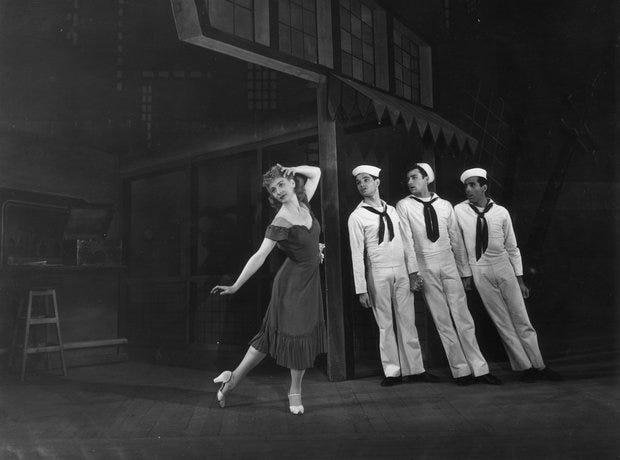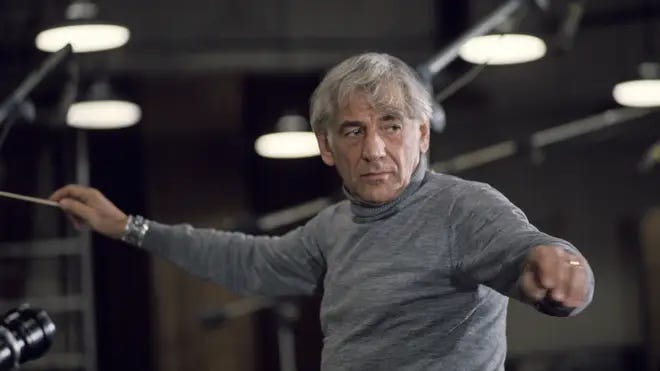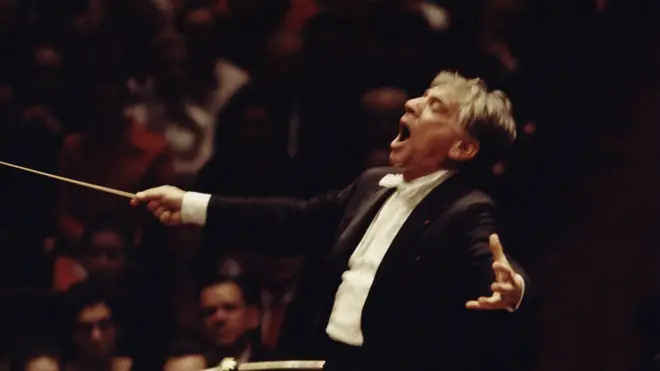Maestro: Reflections on the Bernstein Enigma & the 2023 Movie.
A human puzzle of unequaled metaphors in Music versus Relationships.
It is uncommon that I step out of a movie theater, quietly reflecting while reminiscent of the theme of the work of art I may have enjoyed. There are now too few movies to give me chills or the need to even think about. At best a fun passe-temps, the now often lengthy movies definitely end up second to a great home-cooked meal. The new “Maestro” has Michelin 5-star qualities to keep me in my chair till the credits end. Firstly, the magnificent music in this film, is of course Bernstein’s unequaled magic that rings in one’s ears forever, as unique as his Mahler or Beethoven fireworks, his own “West Side Story” or his closing statement through his thrilling “Chichester Psalms”, a score the maestro, whom I met only twice, allowed me to use for a ballet of the same name (1984).
Often the camera visits the music effectively, like a best friend during a museum visit of the heart. The first fifteen minutes are boosting the protagonist in the company of composer Aaron Copeland and Jerome Robbins, the brilliant choreographer of his first Bernstein ballet (Fancy Free). The opening scene has a comparable vigor and makes the composer’s homosexual relationship as natural us the forties did not. Unquestionably a highlight in the movie, the excerpt of Robbins’s legendary “Fancy Free” is here used almost as a dream scene where Leonard can publicly fancy his future spouse, though still in the presence of three handsome, fun sailors.(Photo credit Getty)
The director (Bradly Cooper) only occasionally shows that the conductor/composer’s sexual preference for men are the second skin he breaths just like his music transpires love from his veins in the sweat of a night of unburdened passion. The film concentrates very much on his relationship with Felicia Montealegre, honoring a family he deeply cares for. But the picture here remains incomplete as there was more than the ‘angst” around the harmful impact his sex-life could bring to his quest of directing a leading orchestra.
How much a two-hour film can show about the very complex genius Bernstein was? It is a pity that little attention was given to his male relationships during the 1940’s with countless letters to prove an inner conflict about his own explorations in a conflicting sexual identity that took him to the cabinet of Frau Marketa Mortis, his intimate friend Oppenheim’s psychoanalyst. Cross-dressing FBI director, Hoover openly fought the gay world (but lived with a man?) in a time where communism and homosexuality joined the list of unbearable diseases, a treat to the American way of life. Marriage was definitely the best cover-up for many gay men, especially when you were groomed to be America’s greatest conductor/composer. (https://yalebooks.yale.edu/2023/11/29/did-leonard-bernsteins-wife-know-he-was-gay/ )
If the movie seduces through detailed camera, in black and white, or color when appropriate to the story telling, the portraying seems indeed well thought out. Miss Mulligan’s nuances are genuine as Mr. Cooper’s mannerism become real the more you follow their well-acted game. Forgotten are the maestro’s Young People’s Concerts, his Harvard lectures, like his young conductor sessions, the television series to educate the American public, all of it somewhat of an I Ching to the composer’s manual while introducing a wealth of classical music into the American homes. So far for the unconventional creator extraordinaire who badly needed his own private life to challenge him in person yet not as in a public court.
Lenny lived his destiny like a Tchaikovsky, a Mahler or Beethoven, as if incarnating a part of each of the conductors he taught, performed as a concert pianist or a conductor. The lexicon he commanded in more than one language, the humor (“God recommended me to become New York Philharmonic’s assistant conductor”) and imagination were amongst the ingredients I was allowed to experience in person during the month of September 1975, when in Paris with the Orchestre National de France he conducted the Ravel Centenary (photo credit: Getty)
Together with Marilyn Horne, I was one of the few guests in his Box at the Theatre des Champs Elysees. As he loved ballet, he took a quick liking to me, enough to invite me to a surprise party at his giant suite at the Hôtel La Trémoille. When the cape flew through the entrance hall, and his golden fingers touched the keyboard, he sang in German “Where have all the flowers gone”. The room full of champagne, caviar and salmon, and the best-looking men in Paris turned into another world and the maestro showed an intriguing myriad of personalities with all of the nuances from all of the musical masterpieces he had just interpreted. What follows one can read next year in my new novel.
For now, I believe that Bradley Cooper could not be limited by a 52-week long television series if he wanted to touch Leonard Bernstein’s larger than all of his life’s achievements. For now, “Maestro”, his second movie as a director, goes down like a well-aged brandy, gleaming with traditional values of old and ever so delicately, many unrequited themes of freedom. As an actor Mr. Cooper “re-incarnates” into the role of a human story teller whose art had taken over his entire life, never finished sharing himself with millions, till there’s is so little left of himself and the many selves a creator can be, that a family life becomes a fairy-tale land. A such Mr. Cooper gives the performance of a lifetime, becoming within minutes briefly the beloved Bernstein, bathing us in the orbit of an Olympic Apollo who loved to the fullest the world as he perceived it, adoring his closest friends and family, forgetting himself in the dissociation of his own legend.







